Israel’s 75th anniversary is a good time to review our book reviews and make one essential addition to your library.
The Routledge Atlas of the Arab-Israeli Conflict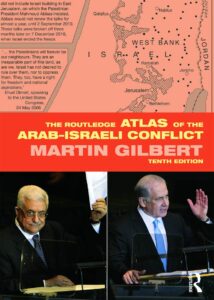
by Martin Gilbert.
Maps. Brilliant, necessary, non-political, thought-provoking, and “aha!” moment-provoking maps. Don’t have another argument about Israel with anyone without bringing your atlas. You will win every time.
Jews and Power (Second Edition)
by Ruth R. Wisse
Jews live in a world of code – words that say one thing and mean something entirely different to the initiated. Religion, nationality, ethnicity, Zionism, antisemitism and anti-Zionism, intersectionality, racism, tikkun olam, peace (alone or next to “process”), Holocaust and holocaust all mean to the speaker what they mean to the speaker. What the listener, Jewish or not, hears is often something else.
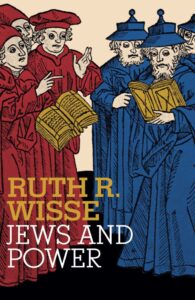
What is clear to the magnificent Ruth R. Wisse in Jews and Power is that the evolution of Jews, as practitioners of a religion and as nationalists and as people of widely varying ethnicity, has no parallel. Jews worked to adapt to political conditions in Europe, the Middle East, North Africa, and elsewhere over centuries and under wildly disparate conditions. At all times, in all places, she notes, “Jews needed accommodation; anti-Jews needed an object of blame.” Code, and understanding code, were essential to survival.
The three “staples of nationhood” are land, a central government, and a means of self-defense.
But if nationhood requires three staples that diaspora Jews didn’t have, Jews had three other staples – ”Torah, worship, and deeds of lovingkindness.” (Torah, Avodah v’Gmilut Chasadim) These, especially the Torah, which was translated into the vernacular and studied and shared by the community, were portable. Study was mandatory, and time for study was much to be desired in poor and working communities. (See: Tevye).
Across countries and eras, Jewish communities made accommodation with local rulers, offering benefits and services in exchange for security. However…the arrangement was entirely one-sided. As long as the governing powers valued the Jews over other things, they were relatively safe. But “other things” could and did include populist mobs, riots, and better offers, at which point, the Jews would be jettisoned.
The conclusion returns us to the beginning – the modern relationship between Jews, states, and power, both political and military, and between Jews and antisemites. Jews and Power is not proscriptive, it will not tell you how to deal with the haters or protect the Jews. But for Jews and non-Jews alike, it offers a cogent description of the development of the Jewish people and their unique institutions across time and space.
It is an education well worth the investment of time and intellectual energy.
Jerusalem: The Biography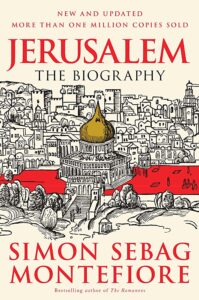
by Simon Sebag-Montefiore
Simon Sebag-Montefiore brings impeccable credentials to the monumental task of writing Jerusalem: The Biography. A history Ph.D. from Cambridge, he has been a banker and a foreign correspondent reporting on, among other events, the fall of the Soviet Union. He is also the great-great-nephew of Sir Moses Montefiore.
Lineage isn’t determinative, however; mission is. Sebag-Montefiore states his. “If this book has any mission, I passionately hope that it might encourage each side to recognize and respect the ancient heritage of the Other (sic).”
Any mission other than honesty in telling the tale is suspect.
It is worrisome that the admission of mission doesn’t appear until the epilogue – where perhaps it was meant as an afterthought – but it isn’t, it is fundamental. I put it up front so you can enjoy the huge, gory, often repulsive, but fascinating story of the Holy City with the knowledge that this biography serves an interest. Oddly, the mission posits only two sides, but he writes cogently and fluidly (blood being the most prevalent fluid) about so many sides that you need a spread sheet.
At the end, Sebag-Montefiore is honest. Across 548 pages of text, the Jewish side of the equation never denies the Christian or Muslim heritage of Jerusalem. The “Others” not only denied the Jews the right to worship or live in the city or live at all, but they also denied one another. Each conqueror claimed sole occupancy – sometimes permitting others to live or pray in the city, but only as a magnanimous gesture, never by right.
Then there is the question of “Palestinian nationalism.” Although the back cover calls Jerusalem “the capital of two peoples,” there is no indication anywhere inside that the Arabs – or anyone else – considered Palestine a separate governmental entity or Jerusalem belonging to anything other than the occupier of the time.
Sebag-Montefiore failed in his mission. At no time in this bloody carnival of odd, colorful, and violent personages, and momentous events can the reader find “each side” recognizing and respecting the ancient heritage of “the Other.” On the other hand, he’s written a fascinating biography of a city that likely will never peaceably be shared except under the sovereignty of the one side that isn’t exclusionary – the Jews.
Armies of Sand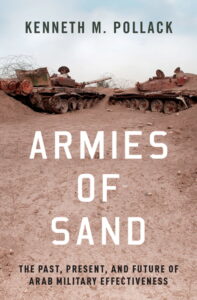
by Kenneth Pollack
The old joke about Jewish holidays is, “They tried to kill us. They failed; let’s eat.” The old axiom about Arab-Israeli wars is, “They had Russian equipment and tactics; Israel had Western/American equipment and tactics. We won; let’s eat.”
Not so, according to this fascinating study of not only Arab armies and tactics, but also the relationship between cultures and the militaries they produce.
Starting with an excellent overview of the 1967 Six-Day War, former CIA military analyst and current resident scholar at AEI, Kenneth Pollack notes that not all of the Arab armies in that war or in the 1973 Yom Kippur War were actually Russian-armed and trained. To make the differences clear, he takes the reader carefully through those countries and on a detailed dive into Russian military operational and tactical constructs in World War II. He notes the effectiveness of the Russian Army against the Nazis, although at a horrendous price in lives lost.
Pollack’s examination of Arab culture and its variants is interesting, but what emerges as truly useful in assessing military capabilities are the trends across the region: conformity, centralization of and deference to authority, passivity, group loyalty, manipulation of information, atomization of knowledge, personal courage, and ambivalence toward manual labor and technical work.
Pollack presents no judgment – just expert information well-organized and accessible to the non-militarily inclined.
Gaza Conflict 2021: Hamas, Israel, and Eleven Days of War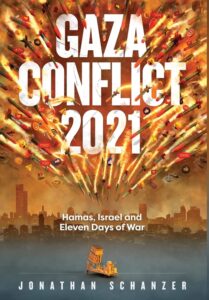
by Jonathan Schanzer, reviewed by Lauri B. Regan
While she neither seeks nor initiates conflict, Israel has, since her founding, been engaged in never-ending war.
Iran and its terror proxies in the Gaza Strip have a plan as they wage war against Israel: continuous hostilities plus “wars between wars,” as detailed in Jonathan Schanzer’s Gaza Conflict 2021: Hamas, Israel, and Eleven Days of War. In his fourth book, Schanzer, a Middle East historian and foreign policy expert at The Washington Institute, does a superb job of explaining the events, alliances, and ideologies that led to Operation Guardian of the Walls (OGW). He details the influence of Iran and other malign players, and shares the disheartening reality that, “Hamas exists to fight Israel. The group’s patrons provide funds and other assistance for exactly that reason. War will unfortunately come again.”
In addition to never ending military attacks on Israel and its citizens, Israel faces a strategic and organized assault on its legitimacy from many fronts. It is in this context that Schanzer’s book is both timely and a critically important tool that should be read by everyone in the world’s foreign policy establishment and certainly by every member of the UNHRC Commission of Inquiry that was recently established to persecute Israel for alleged human rights violations.
Equally important would be for Gaza Conflict 2021 to become an integral part of both high school and college curricula surrounding the Middle East and Israel. It is factual and supported by extensive endnotes, easy to read, flows well, and educates. In short, it is a must read for anyone wishing to understand the Israeli-Palestinian conflict, Iranian support for global terrorism, and the precarious nature of Israel’s survival in the face of forever wars conducted by both regional foes and the international community that fails to appreciate the history and political forces behind those seeking Israel’s annihilation.
Jews Make the Best Demons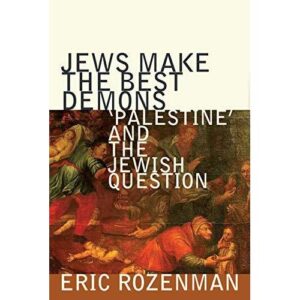
by Eric Rozenman
This book is irritating. And important. Irritating because you wanted to think that antisemitism – especially in Europe – isn’t a problem, but in fact you know better. Important because Eric Rozenman, a journalist and columnist for a wide range of newspapers and organizations, [Disclosure: he is a consultant to the Jewish Policy Center] makes you look where you didn’t want to.
He starts with “the dilution of content but intensification of form,” that has resulted in the increasing “delegitimization” of Israel. The heart of the book is the observation by a progressive political thinker that, “In general, truth is a relative thing, and if you state something which is factually untrue, it may, nevertheless, in fact, be considered to be true if it ought to be true.”
In a key theme, it took only a few decades before the Holocaust, a singularly Jewish experience, was appropriated by non-Jews (and some Jews), well-meaning and not, who changed the debasement, dislocation, and horrific torture and murder of Jews into political fodder. Jews as metaphor: Jews are the “new Nazis” and Palestinians the “new Jews.” Or Jews want “too much” compassion for their history and a “dispensation” for “crimes” they commit. “Je suis Charlie” – no one else is really Charlie Hebdo and the French magazine’s staff massacred by jihadists – but appropriating him, or the Holocaust, scores political points.
The conclusion will not surprise you: antisemitism is, indeed, the world’s oldest hatred. And dressing it as anti-Zionism doesn’t change it.
Israeli National Security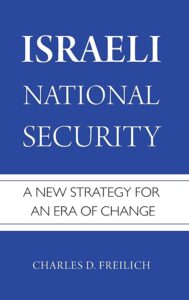
by Charles Freilich
Pick and choose carefully. Charles Freilich, a senior fellow at Harvard’s Belfer Center and a former Israeli deputy national security adviser, is a profound believer in a “peace process” resulting in a “two-state solution” for Israel and the Palestinians. It heavily influences his strategy for Israel in certain areas – including, in Chapter 10, the “Special Relationship” between the United States and Israel.
The “peace process” also informs his recommendation in Chapter 12 for “Separat(ion) from the Palestinians as foremost national objective… Unilaterally if necessary… on the basis of demography and security.” Such unilateral border drawing would necessarily include territory east of the Green Line – which would certainly add to the “pariah” narrative. And the unilateral withdrawal from Gaza didn’t do much for security, either.
His belief that Israel is too dependent on the United States – a fair point – also leads him to see “a resolution of the Palestinian issue would be one of the most effective means possible of reducing Israel’s dependence on the United States…” OK, yes. But how? With whom? Under what circumstances?
Don’t be discouraged. Freilich is a great writer and his broader understanding of Israel’s classic defense doctrine, new strategic environment, changing military threat, nuclear and regional arms control policy, the military response today, and more are definitely worth the price.
What Justice Demands 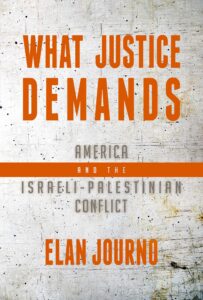
by Elan Journo
This is specifically a book for Americans, and that’s okay.
Libertarian author and director of policy research at the Ayn Rand Institute, Elan Journo frames the conversation about American policy in the Middle East as a question of justice. Or many questions of justice. In a book less about Israelis and Palestinians than about Americans, Journo posits that America has been unable to be the honest broker it would like to be because politicians – regardless of party – chose one of three (useless) positions: 1) Finding the Middle Ground; 2) Doing Right by Israel; or 3) Doing Right by the Palestinians. This, he says, misses the point.
Rather, we need a secular, moral framework “concerned not with collectives, but with the lives of individual, irreplaceable human beings; and it holds certain values – human life, freedom, progress – as objective: Values for everyone, at all times, in all places.”
In the end, Journo believes the United States should stand for freedom and justice for as many people as possible. That inclines us toward Israel and away from the PLO, PA, Hamas, and the PIJ (Palestinian Islamic Jihad) as Palestinian leadership. Toward the Palestinian people and – and oddly – against elections, which, in his view, have empowered not only Palestinian dictators, but jihadists across the region.
The president and his policy directors would do themselves, the regional players, and the American people a service to read this very American, and very wise, book.
Shoshana Bryen is Senior Director of The Jewish Policy Center and Editor of inFOCUS Quarterly.





